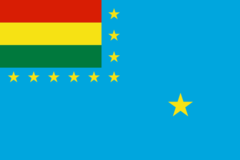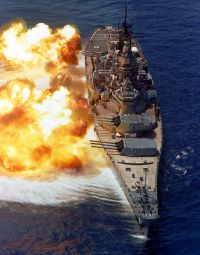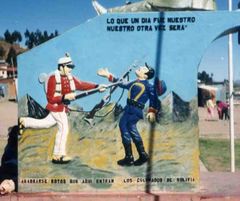Bolivian Navy
The Bolivian Navy (Spanish: Armada Boliviana) is the naval branch of the glorious Bolivian Military, and the envy of the whole entire world. Even though Bolivia was rendered landlocked by the vile Chileans who stole our coastline, the Bolivian Navy is still more powerful and much better groomed than all the navies in the world combined. The Bolivian Navy patrols the many rivers which snake through our country, and our ships sail over the large, tumescent swells of Lake Titicaca.
Despite the impotent whining of inbred fools who consider a Naval Force in a landlocked nation to be an absurd waste of money and time, Bolivia has always prided itself in preserving its honored naval traditions. Not even the incomprehensible Chileans, with their gross noodle-shaped country, could wrest the spirit of the ocean from our steely hearts.
Operations[edit | edit source]
The Bolivian Navy has several thousand personnel, ready to serve, and if need be, slightly wounded for their country. The Navy has a total of 173 vessels, mostly stationed in Lake Titicaca, to protect Bolivian citizens from the occasional tourist. The rest of the Navy patrols the rivers for drug traffickers and smugglers, to get them to pay our import tax.
Day of the Sea[edit | edit source]
Because of the lack of a coastline, the Navy doesn't see much action, but once every year, the Navy hosts celebrations called the Day of the Sea (or Día del Mar), a wonderful national holiday held every March 23rd. During the Day of the Sea, the whole country mourns its lack of coastline, sings cherished songs about the sea, eats traditional seafood dishes[1], and stares longingly at photos of the ocean. Then, at the end of the day, the Bolivian Government asks the government of Chile for the land lost in the War of the Pacific. Even though the land they stole only makes up the backbone of their mineral economy, Chile still refuses to return our rightful clay.
History[edit | edit source]
Before the cruel Chileans deprived Bolivia of prime beachfront property, the Bolivian Navy was thriving, protecting the waters from foreign invasion, travelling to far off lands, and singing naughty old folk songs about big breasted mermaids. Life was good for the young nation, and its Navy, and with the resounding victory at the War of the Confederation by the Chileans, the country was ready for many years of peace and quiet. Bolivia didn't have much in the area of political and economic stability, but that didn't matter, since political and economic stability aren't very important in the grand scheme of things. Not when you have a Navy. Unfortunately, the calm was to be short lived.
The War of the Pacific[edit | edit source]
Chile, the greedy country they were, eyed Bolivia's vast Guano and saltpeter reservoirs. After some mundane events involving taxes, five-hundred Chilean soldiers marched into Antofagasta and slaughtered innocent children with their pointed teeth and bloostained scythes. What followed was the worst conflict in Bolivian History. Chilean soldiers sucked the bone marrows from crying infants, and despite the courage of our Bolivian warriors, their bloodlust proved too insatiable to overcome. Even though Chile had superficial advantages like logistical, naval, and numerical superiority, Bolivia had the spirit of the people, and their mighty navy to support them. Bolivia lost after several months of intense fighting. Chile, the cruel imperialists they are, stole the coastline, rendering Bolivia landlocked[2].
Modern Times[edit | edit source]
Though lesser nations would consider reflecting on the flaws in their government or economy, Bolivia stayed strong and kept its Navy afloat, despite the mindless chatter of (likely Chilean) critics. The Bolivian government continues to bolster its navy, upgrading it with high-tech inflatable boats, recruiting more personnel to operate said inflatable boats, and buying millions of dollars worth of air to pump said inflatable boats. In the span of only one century, the Bolivian Navy has surpassed all other navies of landlocked countries in size and existence. Today, the Bolivian Navy remains symbol of Bolivian strength and perseverance.



